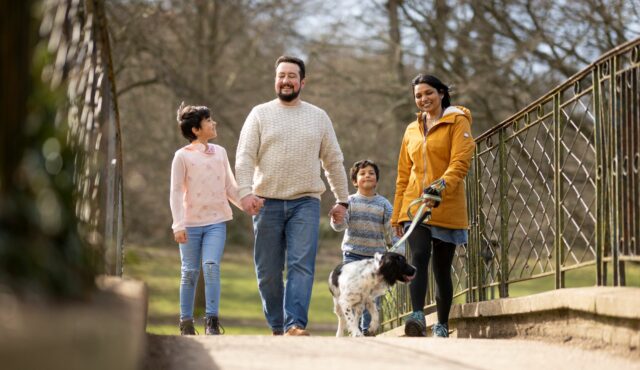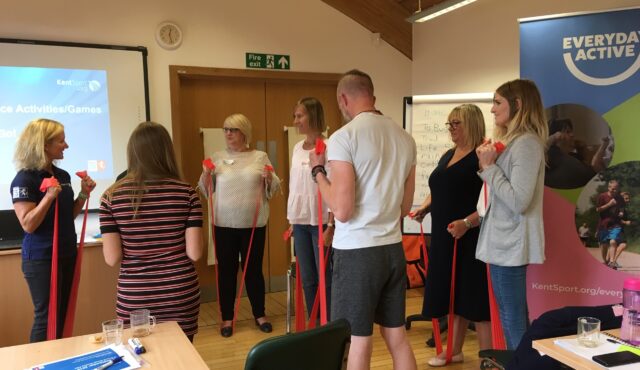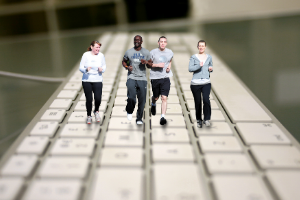Spotlight on: Menopause and Movement
Introduction
Every woman’s experience of perimenopause and menopause is different, but evidence shows that physical activity can help women manage and cope better with their symptoms.
Our Spotlight on: Menopause and Movement looks at some of the common signs and symptoms of menopause, the benefits of movement and keeping active and some useful resources that offer support for women going through this key life stage.
Perimenopause vs Menopause
Perimenopause is the transition leading up to the time before your periods stop, when you may have symptoms. There’s a variation how long this can take, but the average is 4 years. Normally, your GP can confirm a diagnosis of perimenopause based on your symptoms, but sometimes a blood test may be used, particularly if you are under 45 years.
Sometimes, women may experience early menopause. This is when your periods stop before the age of 45. If this happens before age 40 then this is known as ‘primary ovarian insufficiency’ (POI). Often the cause is unknown, but it can be related to genetic or autoimmune conditions, some cancer treatments (chemotherapy or radiotherapy) or surgical removal of the ovaries. It is more common in women who have a strong family history of POI.
Menopause refers to the day after which you haven’t had a period for 12 consecutive months. This is due to a reduction in hormone levels (oestrogen and progesterone) as your ovaries stop producing eggs. The average age is 51 in the UK, but it can start much earlier, or much later than this.
Postmenopause is the time after your periods have stopped for 12 months.
Symptoms of Menopause
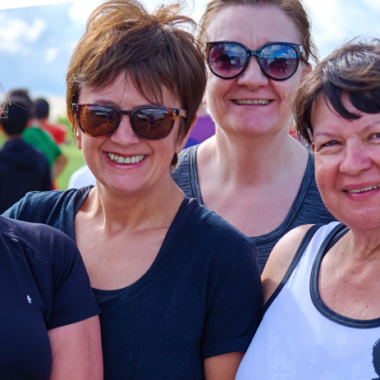
Around 8 in 10 women experience menopause symptoms and they last an average of four years. Menopause typically occurs between ages 45-55 and this is an age group that is also particularly inactive, with 36% of those aged 45-54 not reaching Chief Medical Officers guidelines of 150 minutes of moderate intensity activity per week.
Menopause can make women more at risk of osteoporosis (weakened bones) due to reduced levels of oestrogen as well as contribute to other conditions such as diabetes, stroke and heart disease. Regular exercise can help prevent or manage these conditions, improving health and wellbeing in a number of ways.
Reduced levels of oestrogen in the body can cause most menopausal symptoms.
Every woman’s experience of perimenopause and menopause is different, but some common symptoms include:
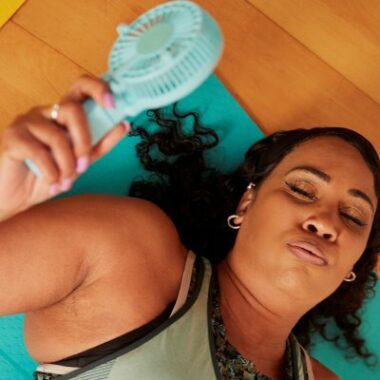
Hot flushes - Irregular periods
Changes to your mood (Brain fog)
Problems with memory or concentration
Difficulty sleeping - Heart palpitations
Headaches and migraines - Skin Changes
Changed body shape - Weight gain - Vaginal dryness and pain
Move to improve Menopause
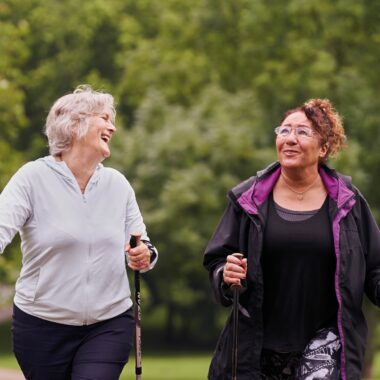
Evidence shows that being active through the perimenopause and menopause can help women manage and cope better with their symptoms. Keeping active and moving more can help:
- Improve sleep and feel less tired.
- Regulate weight.
- Reduce the risk of anxiety and depression.
- Improve muscle tone and decrease body fat.
- Alleviate joint pain.
The Chief Medical Officers’ (CMO) guidelines for physical activity in adults is at least 150 minutes of moderate intensity or 75 minutes of vigorous intensity per week. Moderate intensity means your heart rate increases but you can still hold a conversation. Also aim for strength and balance exercise on 2 days a week.
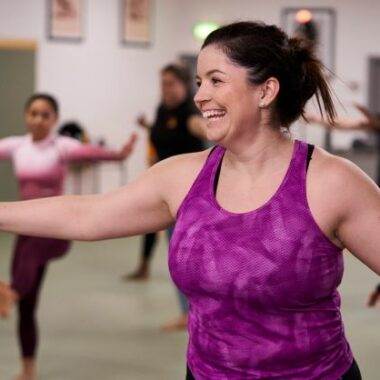
Everyday Active
To start with, be realistic with your activity goals. Making a simple plan and try to stick to it. The challenge is to go back to your plan, even if you fall off it for a few days due to unavoidable circumstances. Perhaps recruit a friend or relative to help keep you motivated and accountable during this time?
Try including weight-bearing activities where your feet and legs support your weight like walking, running or dancing.
Everyday Active offers hints, tips and activity ideas for moving more through the menopause. We’re sure you’ll find something to enjoy that’ll help you move through every stage of life.
Follow this link to explore activity ideas to move through the menopause
Local Support Services
tm active Women’s Wellness Hub
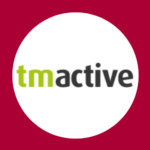 Offering women the confidence to participate in physical activity and see the positive health benefits on their physical and mental wellbeing. Delivered in small groups, courses include a mixture of strength and stretching exercises to improve upper and lower body, and core strength, and support for mental wellbeing. Ideal for women aged 35-55+.
Offering women the confidence to participate in physical activity and see the positive health benefits on their physical and mental wellbeing. Delivered in small groups, courses include a mixture of strength and stretching exercises to improve upper and lower body, and core strength, and support for mental wellbeing. Ideal for women aged 35-55+.
Follow this link to view the Women’s Wellness Hub
Places Leisure
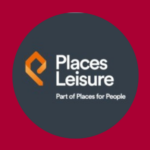 A 12 week Move through Menopause course created to empower women by helping them learn about the condition, meeting other women who are going through the same thing, and ultimately closing the stigma around menopause. Sessions are run by our professional in-house team and are split into two sections. The first is information-based with the opportunity to open up topics for group discussion and the second is movement-based guiding you through the activities on offer at the Leisure Centres in Dover and Dartford.
A 12 week Move through Menopause course created to empower women by helping them learn about the condition, meeting other women who are going through the same thing, and ultimately closing the stigma around menopause. Sessions are run by our professional in-house team and are split into two sections. The first is information-based with the opportunity to open up topics for group discussion and the second is movement-based guiding you through the activities on offer at the Leisure Centres in Dover and Dartford.
Follow this link to view the Move Through Menopause Course (Dover)
Follow this link to view the Move Through Menopause Course (Dartford)
Midlife Makeover
 An online platform which offers help to women from peri-menopause, menopause and post menopause. Created by Sam Palmer, Menopause Health & Fitness Expert, qualified Nurse and Running Coach based in Sevenoaks, Midlife Makeover can help you get back your confidence to start living the life you want to live. Whether you are looking for help with symptoms of menopause, alternatives to hormone therapy or information about menopause at work, Sam offers a range of support and services.
An online platform which offers help to women from peri-menopause, menopause and post menopause. Created by Sam Palmer, Menopause Health & Fitness Expert, qualified Nurse and Running Coach based in Sevenoaks, Midlife Makeover can help you get back your confidence to start living the life you want to live. Whether you are looking for help with symptoms of menopause, alternatives to hormone therapy or information about menopause at work, Sam offers a range of support and services.
Follow this link to access Midlife Makeover support and services
Thrive
 Supporting women to their best health and empowering them with the knowledge to do so. Created by Claire Grant, a Women’s Health Specialist, Thrive supports women through the peri to post menopause years and all that entails, whether natural or medically/surgically induced. It is not an illness or condition, it is a phase of life that all women will go through. Offering 1 to 1, small group or larger gathering sessions. All can be tailored to specific needs, comprising of specific workshops, mini courses and 6 or 12 week programs.
Supporting women to their best health and empowering them with the knowledge to do so. Created by Claire Grant, a Women’s Health Specialist, Thrive supports women through the peri to post menopause years and all that entails, whether natural or medically/surgically induced. It is not an illness or condition, it is a phase of life that all women will go through. Offering 1 to 1, small group or larger gathering sessions. All can be tailored to specific needs, comprising of specific workshops, mini courses and 6 or 12 week programs.
Follow this link to access Thrive support and services
Mid Kent MIND
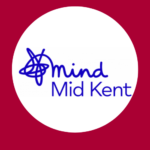 A 3 week course which is designed to offer mental health support and movement sessions that can help you through this challenging time of life. A safe and supportive space for you to meet new people and connect and share experiences. Each week you will also be introduced to a series of gentle movements that can help lift your mood and improve your overall wellbeing.
A 3 week course which is designed to offer mental health support and movement sessions that can help you through this challenging time of life. A safe and supportive space for you to meet new people and connect and share experiences. Each week you will also be introduced to a series of gentle movements that can help lift your mood and improve your overall wellbeing.
Additional Resources
British Menopause Society
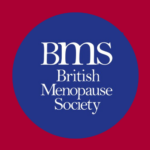 The British Menopause Society (BMS) is the specialist authority for menopause and post reproductive health in the UK. Established in 1989, the BMS educates, informs and guides healthcare professionals, working in both primary and secondary care, on menopause and all aspects of post reproductive health.
The British Menopause Society (BMS) is the specialist authority for menopause and post reproductive health in the UK. Established in 1989, the BMS educates, informs and guides healthcare professionals, working in both primary and secondary care, on menopause and all aspects of post reproductive health.
Follow this link to access BMS information and guides
National Institute for Health and Care Excellence (NICE)
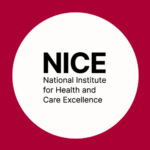 The NICE guideline covers the diagnosis and management of menopause, including in women who have premature ovarian insufficiency. The guideline aims to improve the consistency of support and information provided to women in menopause.
The NICE guideline covers the diagnosis and management of menopause, including in women who have premature ovarian insufficiency. The guideline aims to improve the consistency of support and information provided to women in menopause.
Follow this link to view the NICE Guidelines for Menopause
Moving Medicine
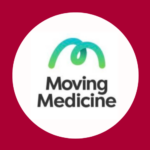 Moving Medicine is a comprehensive resource designed to help healthcare professionals integrate physical activity conversations into routine clinical care. They’ve launched a new resource to help healthcare professionals have better conversations about physical activity with people experiencing menopause.
Moving Medicine is a comprehensive resource designed to help healthcare professionals integrate physical activity conversations into routine clinical care. They’ve launched a new resource to help healthcare professionals have better conversations about physical activity with people experiencing menopause.
Follow this link to download the Menopause information leaflet
Menopause Matters
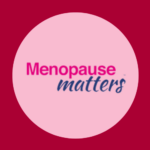 An award winning, independent website providing up-to-date, accurate information about the menopause, menopausal symptoms and treatment options. Here you will find information on what happens leading up to, during and after the menopause, what the consequences can be, what you can do to help and what treatments are available.
An award winning, independent website providing up-to-date, accurate information about the menopause, menopausal symptoms and treatment options. Here you will find information on what happens leading up to, during and after the menopause, what the consequences can be, what you can do to help and what treatments are available.
Follow this link to view Menopause Matters
Menopause Cafe
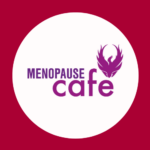 At a Menopause Café people, often strangers, gather to eat cake, drink tea and discuss menopause. Menopause Cafés are offered in an accessible, respectful and confidential space; open for all, regardless of gender or age; have no intention of leading people to any conclusion, product or course of action; are on a not for profit basis.
At a Menopause Café people, often strangers, gather to eat cake, drink tea and discuss menopause. Menopause Cafés are offered in an accessible, respectful and confidential space; open for all, regardless of gender or age; have no intention of leading people to any conclusion, product or course of action; are on a not for profit basis.
Follow this link to find a Menopause Cafe near you
NETBALLHer
 Menopause is inevitable for all females, it’s a time when many struggle to stay playing, coaching or officiating netball. Netball can help midlife women to navigate their symptoms, be healthy and strong – when done in the right way.
Menopause is inevitable for all females, it’s a time when many struggle to stay playing, coaching or officiating netball. Netball can help midlife women to navigate their symptoms, be healthy and strong – when done in the right way.
Follow this link to read articles from NetballHer to keep in the game
OutdoorHER
 Inspired by conversations with walkers, climbers and leaders about managing their periods, menopause and toileting when out in the wild, BMC and Mountain Training have created some simple ‘how-to’ guides that go through these topics and more. The resource is for everyone who is looking to learn more about women’s health and kit requirements in the outdoors, from participants to leaders and allies.
Inspired by conversations with walkers, climbers and leaders about managing their periods, menopause and toileting when out in the wild, BMC and Mountain Training have created some simple ‘how-to’ guides that go through these topics and more. The resource is for everyone who is looking to learn more about women’s health and kit requirements in the outdoors, from participants to leaders and allies.
Our Menopause Commitment
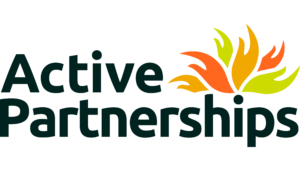 Active Kent & Medway is one of 43 active partnerships across England. We join our colleagues across the national network as we commit to taking positive action within our local area to:
Active Kent & Medway is one of 43 active partnerships across England. We join our colleagues across the national network as we commit to taking positive action within our local area to:
- Raise awareness and educate about signs and symptoms and the benefits of being active during perimenopause and menopause.
- Promote and normalise conversations internally and externally with partners and stakeholders.
- Encourage an environment of openness and transparency where everyone can talk about menopause.
- Change mindsets on how women can be supported through key life stages to be active in a way that suits them.
- Work collaboratively to influence the system to remove barriers currently preventing women from being as active as they would like to be.
- Create accessible, well-publicised policy or guidance documents for colleagues and line managers.
- Share knowledge and expertise as well as signpost to support and resources.
Contact Us
If you’d like to discuss any of the above articles or would like any further information on moving through the menopause, please get in touch with Elise Rendall, our Physical Activity Manager via email elise.rendall@kent.gov.uk.

